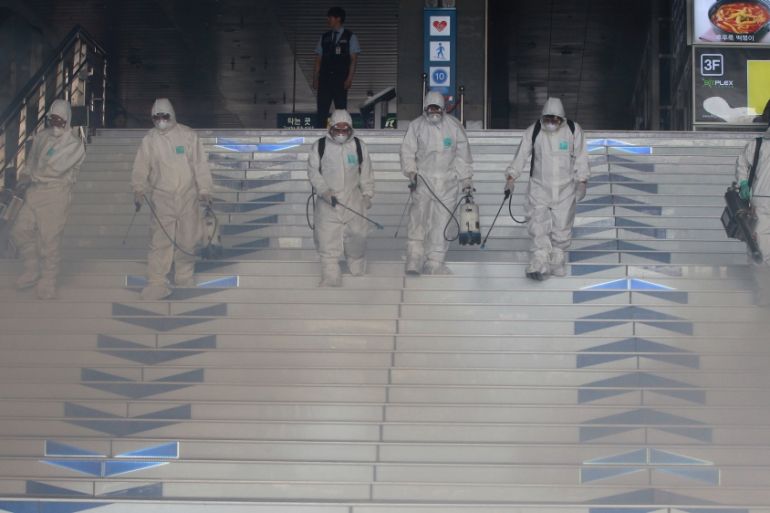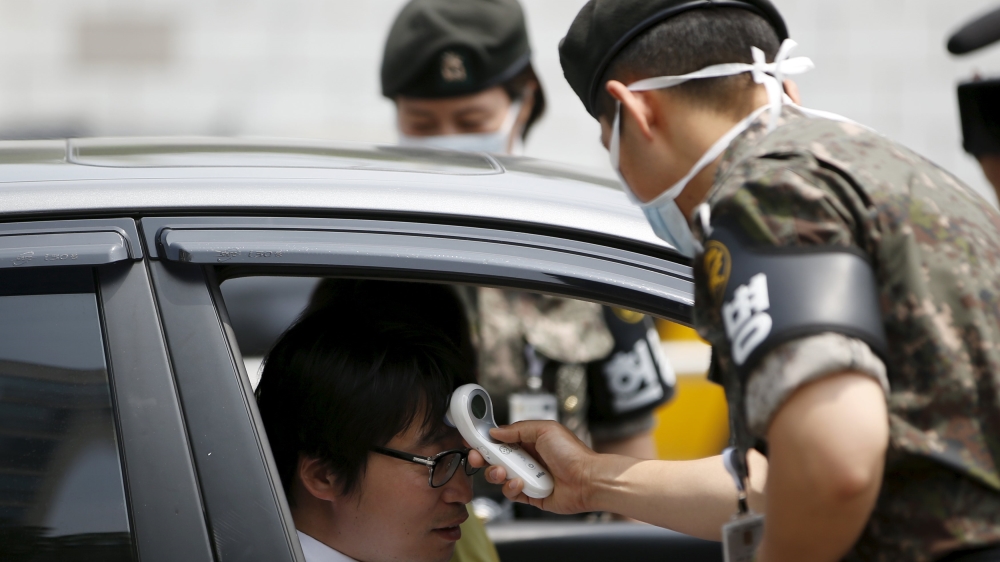South Korea confirms new MERS cases
Number of fatalities rises to 10 as central bank cuts interest rates due to economic threat posed by the outbreak.

South Korea has confirmed 14 new cases of the Middle East Respiratory Syndrome (MERS) virus as the economic damage caused by the outbreak begins to grow.
In what has become the largest outbreak of MERS outside Saudi Arabia, South Korea reported the new cases on Thursday, including the first infection of a pregnant woman.
Keep reading
list of 4 itemsThe inexplicable rise of kidney disease in Sri Lanka’s farming communities
Europe endured record number of ‘extreme heat stress’ days in 2023
Deadly Sahel heatwave caused by ‘human-induced’ climate change: Study
The new diagnoses brought to 122 the total number of confirmed cases in South Korea, the health ministry said.
The number of fatalities rose to 10, with one new death reported on Thursday.
More than 2,400 schools have been closed as a result of the outbreak.
|
|
Lee Ju-yeol, Bank of Korea governor, said slowing exports and threats to business from MERS were central to the decision to cut its benchmark rate by a quarter percentage point, to a record low of 1.5 percent.
“It has been seen that this MERS crisis is having a negative impact on consumer spending,” Lee said on Thursday.
“The full impact of the outbreak still remains uncertain but we thought it was desirable to act pre-emptively to curb its negative impact on … the economy.”
South Korean businesses, including shopping malls, restaurants and cinemas, have reported a sharp drop in sales as people shun public venues with large crowds.
More than 54,000 foreign travellers have also cancelled planned trips to the country so far this month, according to the Korea Tourism Board.
“WHO does not recommend any sort of travel ban at this time,” Alison Clements-Hunt, spokesperson for the World Health Organization-South Korea joint mission on MERS, told Al Jazeera.
“We occasionally have MERS exported from the Middle East, where it is circulating. Countries can put in place more surveillance measures so that we can stop outbreaks.
“We have stopped all previous outbreaks through good infection-prevention control measures.”
Region on alert
Against this backdrop, Hong Kong has issued a “red alert” warning against non-essential travel to South Korea for health reasons.
South Korea says WHO guidelines do not warrant such action.
Residents of Hong Kong are particularly sensitive after an outbreak of Severe Acute Respiratory Syndrome (SARS) killed 299 people in the city in 2003 and prompted global panic.
The MERS virus is considered a deadlier but less infectious cousin of SARS.

On Wednesday, the area around a health clinic inside a metro station in Hong Kong was cordoned off and officials donned protective gear after a woman returning from South Korea showed flu-like symptoms.
Surgical masks reportedly sold out in shops around the station, but Hong Kong officials confirmed on Thursday that the woman had tested negative for MERS.
In another Chinese autonomous region, Macau, authorities have also warned residents against travel to South Korea unless absolutely necessary.
One case has been reported in China, that of a South Korean man who travelled there after defying a suggestion from health authorities in South Korea that he stay in voluntary quarantine.